In this edition of the Sportskeeda Awards for 2014, we bring the men in the dugout into focus. These poor souls are the ones who get sacked at the drop of a hat – but the names on this list are among the most coveted managers in the game. Over the calendar year 2014, these men have amazed us with their almost telepathic understanding of the game.From underdogs taking out the big cats, to the big cats themselves handling almost unbearable pressure – we have it all. The World Cup was an added bonus this year, as always bringing with it names that we will remember for years to come.Honourable Mentions - Vahid Halilhodzic, Rudi Garcia, Alejandro Sabella, Jorge Sampaoli and Jurgen Klinsmann.VOTE at the end of the slideshow for the best manager of 2014.
#10 Jose Pekerman
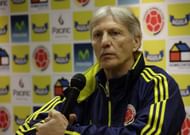
Colombia’s first foreign coach in over 30 years certainly looked like he was right at home during the World Cup, with his team playing some of the most entertaining football seen over the month-long footballing extravaganza. Then again, that shouldn’t be much of a surprise – Pekerman finished his playing career in the country, at Independiente Medellin.
The manager himself has said that he felt “very comfortable, very Colombian”, and all of this factored in the unity that was so apparent in the team. This World Cup represents the first time since France ’98 that Colombia qualified for a World Cup, and their quarterfinal appearance was their best ever finish.
The loss of superstar Radamel Falcao (who was Colombia’s top-scorer during the WC qualifiers) hardly seemed to register in Pekerman’s charges, with James Rodriguez and Juan Cuadrado stepping up their games.
The powerful Jackson Martinez often switched positions with Rodriguez by virtue of the fluid 4-2-2-2 shape, all with the intention of letting the young trequartista have as much as time on the ball as possible. A formation that Pekerman tinkered to resemble a 4-2-3-1 at times, one that allowed Rodriguez to push up further as a second striker. Colombia’s quick transitions were a nightmare to deal with, with the team looking menacing both technically and physically.
The manager was able to bring out one last great performance from skipper Mario Yepes, with the 38 year old warhorse used in a manner that did not expose his lack of pace. All in all, it was a wonderful exhibition of how to play football in an international tournament. Pekerman’s dependence on Rodriguez was based on the understanding that on such a stage, the creation of just a few chances was likely to give you the required results.
He was the man who took Lionel Messi to his first World Cup, and has an astonishing track record in Argentina’s youth set-up to boot. No surprises then, that Colombia have looked to the Argentine to lead their next-gen to the World Cup in 2018.
#9 Jorge Luis Pinto
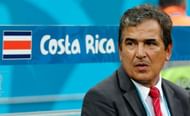
Costa Rica were the surprise package of the World Cup in Brazil, quietly making their way to the quarterfinals in a manner that suggested it was going to take something special to knock them out. Turns out that “something special” was super-sub Tim Krul, whose penalty shootout heroics took the Dutch through.
That it took Lady Luck to bail out Van Gaal’s Dutch team should tell you how well drilled that Costa Rica side was. And they made no qualms about their playing style – this was a solid, disciplined side that took on the big fish and carved them up for lunch.
During the draw for the World Cup, lip readers caught Pinto swearing as Costa Rica were drawn alongside Uruguay, Italy and England. To then emerge top of a group that included three former World Champions probably would’ve seen an expletive-ridden burst of relief from the volatile manager, but I suspect it would’ve been worth it.
The Colombian has great respect for Jose Mourinho, and has made numerous references to the Portuguese in his website. Training and methodology are of paramount importance to both managers, and Pinto’s detailed plans came to fruition in a manner that Mourinho himself would be proud of.
Their 5-4-1, or alternately a 5-2-3, had a high, pressing backline that executed the offside trap perfectly. The pressing is a constant theme throughout the team, and aided with a quick counter-attacking style through their wing-backs, it leaves the Costa Ricans with three men to take advantage of the spaces that open up as they switch the game’s momentum. Captain Bryan Ruiz drove his team on ably, with the raw Joel Campbell’s ability to run in between the lines particularly impressive.
All in all, a team effort that had Pinto’s stamp all over it.
#8 Jose Mourinho
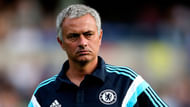
The sneering, indifferent Mourinho we see in press conferences today is an easily offended creature. And not without reason – it is rare when the Portuguese finishes a season without silverware. To be fair, Chelsea should’ve walked away with the title last year. And the manager will know that better than anyone else, despite what he keeps telling all of us.
The sale of Juan Mata, while looking like a master class this year (considering the financial implications), could very well have cost Chelsea the title last year. But Mourinho is well-known for his disregard for players who do not fit perfectly into his game-plan, and it is a game-plan that is looking like it is going to pay rich dividends this season.
And this is not a team that relies exclusively on parking the bus anymore – they have played some of the most enthralling football in the Premier League this time around, and are the top scorers in the Champions League (after the Group Stage).
They will certainly not be averse to parking the bus if the need so arises – the way we saw them take on Liverpool earlier on this year. This is a team that gets the job done at the end of the day, and it is carrying around with it the displeasure of a season gone awry. Stronger and faster than before, they remain the only English team that has the mental strength to take on Europe’s finest. One would think that nothing else would satisfy the serial winner at the helm today.
#7 Antonio Conte
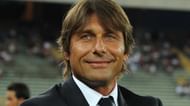
The man in charge of the Italian national team today started the year in charge of Juventus. His departure, by mutual consent, came as a shock to the footballing world, considering the fact that the Bianconeri had just been crowned champions of Italy for the third straight year.
It seems the powers that be miscalculated the demanding Conte, who had grown increasingly vocal about the inability of the Italian clubs to stand toe-to-toe with their European counterparts. The summer transfer window was characterised by rumours that one – or both – of Arturo Vidal and Paul Pogba were on their way to more prestigious destinations.
Coupled with Juventus’ own inability to secure the targets Conte deemed necessary, the manager snapped – leaving the club well into preseason training. Ironically, his departure may well have stalled the potential departures of Vidal and/or Pogba, with the upper echelons of the club’s hierarchy not wanting to destabilise the team.
Conte’s demanding nature has been very apparent in his tenure thus far in charge of Italy, with the coach admitting that he did not have the patience to babysit Balotelli. His impact has been there for all to see – with even legendary midfielder Andrea Pirlo consenting to come out of international retirement for the foreseeable future. There is a very vintage Juventus feel to the team, with Conte predominantly employing the same 3-5-2 formation that served him so well in his time in Turin. There is renewed positivity, with the younger crop of players, including the likes of Alessandro Florenzi, Ciro Immobile, Mattia de Sciglio, Mattia Destro, Simone Zaza and Stephan El Shaarawy, all featuring prominently thus far. With the Italians very much on target for the European showdown in France 2016 – currently second in their group, undefeated and level on points with Croatia – there is much to look forward to under Conte’s stewardship.
#6 Manuel Pellegrini
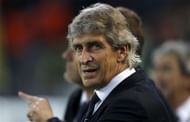
The Chilean has taken to the bustling, ever-changing surroundings of the Premier League with an old-world charisma that delivered the Citizens their second Premier League title in three years. His mild-mannered ways have calmed waters that were rocked by predecessor Roberto Mancini’s rather less eloquent ways.
Let us not forget that Mario Balotelli once roamed these parts, and one has the feeling that Pellegrini would’ve handled the Italian with much more élan than Mancini managed.
To claim a Premier League title in your first spell in the country is nothing short of miraculous, even at a time when the league was stuck in a state of flux. Pellegrini’s charges were playing for the long haul, and made their steady way to the finish line as their rivals lost steam at crucial points in the season.
This season, his handling of Yaya Toure has been particularly impressive. The Ivorian superstar had been vulnerable in the aftermath of his brother’s sudden demise, and had taken to venting his rage at the club in a multitude of ways. Pellegrini allowed the storm to pass, and Toure came to see that City were still the best side for him.
So much so that he has settled into a deeper role this year – a surprise considering how effective he was playing much further forward last year. But Pellegrini has preferred to use two forwards up front this time around, and Toure took a while to get into the hang of things.
The jury is still out on if it is a feasible ploy against the best sides out there (City are set to face Barcelona in the Round of 16 in the Champions League), considering Toure’s reluctance to track back. But rest assured, Pellegrini will find a way – this is, after all, the man who has taken his team to within three points of Chelsea, who looked set to run away with the title not too long back.
All this, without the services of the man now talked among City supporters as perhaps their greatest ever player – David Silva. And with the Spaniard now back in the scheme of things, expect City to go from strength to strength.
#5 Pep Guardiola
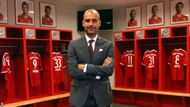
It says much about what the Bavarians expect from Guardiola when his first season in charge of the club is only considered a minor success. This, after a campaign that saw Bayern storm to the title in record time, breaking the record set by Jupp Heynckes’ treble winners just the season before.
They also won the DFB Pokal last season, but what ultimately damaged Pep’s almost unblemished record was the Champions League semi-final loss against Real Madrid.
It wasn’t so much that they’d lost – it was the manner in which they did, knowing that this Bayern Munich team could’ve done much better. Curiously, Bayern were punished much in the same way that Pep’s old side Barcelona suffered at the hands of the Bavarians the year previously.
Put up against a team that was as comfortable in possession as they were potent on the counter-attack, Guardiola’s team lacked any real bite. Despite hogging over 70% of the possession across both legs, Bayern were beaten by Madrid’s athletes and their ability to finish off their chances.
But that remains the curse of innovation – and Guardiola certainly is an innovator. For every night like the 6-2 thrashing of Real Madrid in 2009 (in his time at Barcelona) that saw the words “False Nine” become all too common, there may come results like the 5-0 aggregate loss against Real Madrid (the aforementioned one with Bayern Munich) last season.
This season, Bayern’s fluidity and versatility seem to be stretching the very limits of what tactics can achieve. Their basic 3-4-3 shape morphs into a 3-3-3-1, or a more standard 4-3-3 when the play builds up. The annihilation of Roma saw a 2-7-1 in the early stages, with David Alaba only assuming his position at the back in the last hour or so.
What allows Guardiola such freedom is the remarkable versatility of his players – to whom summer signing Juan Bernat has added his name. The ageless Xabi Alonso provides some much-needed stability, while the pegs around him interchange and transition at a dizzying rate. The flexibility in attack, aligned with a marked improvement in defending against rapid counter-attacks, has made Bayern a sight to behold on the pitch.
The world should beware. Guardiola is on the cusp of something truly revolutionary – once again. And we have Real Madrid to thank for it. Once again.
#4 Louis Van Gaal
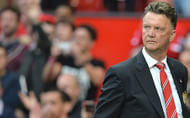
Van Gaal is the only manager on this list who has excelled on both high-profile international and club assignments over the course of the year 2014. The one feature of his 2014 has been his unshakable belief in the way he wishes a football team to function, irrespective of popular opinion.
Kevin Strootman’s injury prompted the manager to abandon the 4-3-3 that has been synonymous with the Dutch national team since the days of Johan Cryuff. His 5-3-2 was seen as a white flag – a defensive backtracking that betrayed the coach’s own reservations about his team.
Instead, the Dutch produced some brilliant, counter-attacking football that saw them blow past defending champions Spain 5-1 in the group stage of the World Cup. Captain Robin Van Persie was practically gushing with adoration as he talked of how Van Gaal “predicted” the game would go.
In the wake of their win against Chile, the boss stressed the importance of allowing his team to play according to the qualities they have, with Memphis Depay scoring on the break against a tiring Chile to seal a 2-0 win.
He was in his element again against Mexico in the Round of 16. First, he took off an in-form Van Persie for Klaas Jan Huntelaar. A drinks break a minute or so later saw the Dutch manager instruct his team to lob long balls for Huntelaar and Dirk Kuyt to get to. The tactical switch worked, with Wesley Sneijder equalising, and then Huntelaar himself converting the penalty that would take the Dutch through.
His inspired decision to bring on Tim Krul for first choice keeper Jasper Cillessen – minutes before the impending penalty shootout - is already the stuff of legend. The move to get inside Costa Rican heads clearly worked, and aided with the Newcastle shot-stopper’s aggressiveness, succeeded in handing the Dutch a semi-final berth nobody saw coming.
His Manchester United side are now third in the Premier League table after an indifferent start to the season. Wayne Rooney is playing without complaint in an attacking midfield role, Van Persie and Juan Mata are thriving of late, and even Marouane Fellaini looks like a player reborn. Quite a year for the old master.
#3 Carlo Ancelotti
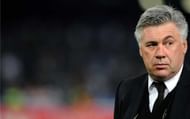
Two words – La Decima. Madridistas everywhere had been pining for years for the elusive tenth European title, while the entire Galacticos project was undertaken with the intent to dominate Europe once again. And even if it took a stoppage-time equalizer from Sergio Ramos to spur Real Madrid to an extra-time win, there can be no doubting Ancelotti’s excellent work before that.
Angel Di Maria – considered by many to be surplus to requirements after Gareth Bale’s arrival – worked his magic from a position in the center of midfield; a position he excelled in his time at Benfica (albeit with less defensive responsibility back then).
The Argentine’s excellent work rate and ability to run with the ball – in itself attributes rarely found in the same player – were crucial to everything Real Madrid did last season. In fact, he was the man-of-the-match on that night in Lisbon, when Atletico Madrid were so close to spoiling their neighbours’ party.
This season has seen even more plaudits come Ancelotti’s way – with the way that the Italian has tinkered with his team of superstars in the wake of the departures of both Di Maria and Xabi Alonso. Toni Kroos has reinvented himself as a deep-lying playmaker, while Columbian sensation James Rodriguez has impressed one and all with his willingness to work for the team. Gareth Bale’s injury saw Ancelotti utilise the archaic 4-4-2 formation to spectacular effect, with prodigy Isco in particular impressing.
It is this ability to get the best out of the players at his disposal that makes Ancelotti tick – proving that the formation at hand is not as important as the way it is implemented, with a team’s transitions and movement holding far more prominence. His affable demeanour makes him the perfect manager for Los Blancos, and it would not be an exaggeration to say that his team are playing the best football on the planet today.
Currently showboating at the Club World Cup, expect the European champions to return and exert their dominance, both in the La Liga and in Europe.
#2 Diego Simeone
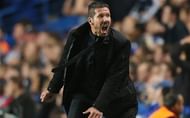
The world does not quite realise what Diego Simeone has achieved with his Atletico Madrid side last season. To break the hegemony of the Big Two in Spain is a miracle worthy of Christ – especially now that the gulf in financial power seems to widen with each passing year.
While Real Madrid and Barcelona spending the summer before last adding shinier toys to their extravagant prams, Simeone was training his team to channel the indomitable spirit that characterised his own playing career at Atletico Madrid (when they last won the League title, way back in 1996).
Building on success after success despite consistently losing players, it was a long-term project that came to fruition last season. A dramatic last day encounter against fellow title contenders Barcelona saw Atletico secure the draw they required, and Spanish football was stunned into silence. And then the applause came.
Minutes away from securing the Champions League title, Simeone’s fighters had nothing more to give as the match went into extra time. Having lost Diego Costa this summer, they recruited Mario Mandzukic, with the Croatian looking like an even bigger threat with respect to one of Atletico’s biggest strengths – set pieces. The impressive Antoine Griezmann, familiar with Spanish football from his time at Real Sociedad, arrived amid interest from a host of European powerhouses.
Jose Gimenez has been a revelation in defense this year, alongside stalwart Diego Godin. With Koke’s quality and Arda Turan’s know-how aiding Gabi’s presence and direction, you can bet that Simeone’s men will not let go of their title without a fight.
#1 Joachim Loew
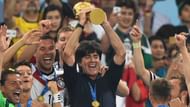
Patience is the name of the game – and nowhere is this more prevalent than in international football. Since replacing Jurgen Klinsmann as Germany’s manger all the way back in 2006, Loew has made a conscious effort to ensure continuity – both tactically and in terms of personnel.
Six of the starting line-up from the 2009 UEFA European Under-21 Championship were due to start the World Cup final in July, at least until Sami Khedira was forced to withdraw. The spine of the team has remained the incomparable Phillip Lahm and Bastian Schweinsteiger, and they have provided the manager with a reliable reference point all these years.
Loew was fiercely criticised as a manager with no “style” of his own, for his tendency to often mimick the tactics from the teams his predominantly Bundesliga-based charges played in. Schweinsteiger’s evolution from a winger to a midfield general, Lahm’s transition from right back to central midfield, and Mario Gotze’s use as a false striker – all were incorporated into Germany’s game, at one point or the other.
After impressive performances at every international tournament of note that didn’t quite deliver the coveted trophies, Loew was under tremendous pressure ahead of Brazil 2014. The unperturbed manager went about his business in a very German way – thorough preparation and single-mindedness.
The extent of their preparation can be seen here, with the Germans building a base camp of their own in Brazil. A location that is today a retreat that offers long-term jobs for the local population, and well as a facility to promote youth soccer.
With such good karma in their intentions, Loew’s side looks even more deserving of their status as World Champions, even as they were far and away the best all-round team in Brazil.
